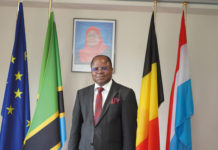Economic Outlook
Second largest economy in West Africa after Nigeria with a growth rate close to 9% in 2018, the Republic of Ghana was amongst the 10 fastest growing economies of Africa in 2019, with a 6.5% growth rate and is the second economy of the ECOWAS. Ghana has managed to significantly lower inflation from 17% in 2016 to 7.2% in 2019 thanks to a steady decline in non-food inflation and a tight monetary policy. According to the West African nation’s parliamentary affairs minister, Ghana’s economy is projected to grow by around 5% in 2021, while inflation is expected to return at 8%.
The primary sector has been the key driver of growth in the three years leading up to 2019, with mining (bauxite, gold, diamond, aluminum and manganese) and agriculture (coconut, cocoa, cashew and coffee) being the main activities. The country’s growth is strongly linked to the increase in hydrocarbon production, which could double again by 2025, to 420,000 bpd. The secondary sector is mainly hydrocarbon refining and metallurgy and the service sector mainly consist in telecommunications, tourism and transport.
The country’s long-standing democratic tradition and favorable economic stability makes Ghana one of the most attractive country for business on the continent, especially as the main economic actors of the region, Ivory Coast and Nigeria, are experiencing growing unrest, allowing Ghana to emerge as one of the new regional economic power.
A growing population and middle class bolster the consumer market, which can be seen by a 2.3% GDP per capita growth since 2015. Ghana also faces a housing deficit.
Ghana is the largest recipient of FDI in West Africa, with more than one-third of the region’s investment flows in 2018.
The government’s new business regulatory reform program is expected to improve the business environment and mobilize domestic revenues, according to the African Development Bank.
Despite this stable economic growth for the past few years, Ghana’s economy remains fragile, especially as it is still too dependent on raw materials. Furthermore, the risk of debt distress remains high, although the increase in public debt has slowed in recent years. Its debt represents more than 60% of its GDP – almost half of which is denominated in dollars – and debt service mobilized 40% of government revenues in 2019.
Ghana has fallen back in the last five years in the Doing Business (114th) and Transparency (78th) indexes due to a deterioration of the business climate and the resurgence of corruption. Investing in Ghana therefore requires local knowledge, an experienced team and a long-term vision.
Banking sector clean-up
In 2017, in order to address the severe solvency, liquidities and assets quality challenging the country’s banking industry, the Bank of Ghana introduced new regulations on poor business practices and weak capitals, which resulted in several market exits and mergers and created a renewed Ghanaian financial landscape.
Transport Hub
Ghana is the second largest West African country in terms of passengers transported each year and the opening of the 3rd airport terminal at Accra Airport in September 2018 increases the capacity of the airport with 5 million passengers per year. The port of Tema in Accra handles significant container traffic destined in particular for neighboring countries that are landlocked, such as Burkina Faso or Mali. It represents a traffic of 750,000 TEU per year with an extension being finalized.
COVID-19
The Covid-19 crisis is expected to slow Ghana’s growth to 0.9 percent in 2020, down from the 6.8 percent initially forecasted.
All sectors are impacted, and their growth revised, with the service sector from 5.8% to -0.8%, the agricultural sector from 5.1% to 3.7% and the industry sector from 8.6% to 0.8%. The decline in tax revenues, combined with the fiscal stimulus, will widen the budget deficit, projected at -11.4% of GDP. The Ghana cedi ended the year 2020 with a depreciation rate of 3.9% to the US dollar and 12.1% against the Euro, making it one of the best performing currencies in Sub Saharan Africa.
Leading sectors
- Telecommunications
- Finance, banking and fintech
- IT services
- Cybersecurity
- Medicines and para-pharmaceuticals
- Medical devices
- Fashion, design
- Industrial machinery
- Agricultural equipment
- Mining
- Energy, off-grid sustainable energy
- Industries, textiles
- Transport & mobility
Ghana at the international level
In 2015, the 193 UN member states agreed on seventeen Sustainable Development Goals to replace the Millennium Goals (2000-2015). Countries agreed, among other things, to eradicate poverty and hunger by 2030, achieve equality between men and women and provide quality education for all.
The SDGs, which are part of the 2030 Agenda for Sustainable Development, also encompass many environmental aspects.
Ghana has chosen 4 main objectives: education, health care, gender equality and the empowerment of women. Ghana’s president chairs the African Union’s Committee on Gender and Development, and the country recently launched an action plan to end child marriage. More than 38 percent of Ghanaian women between the ages of 15 and 19 have experienced sexual violence, and 21 percent of girls are married before the age of 18.
Belgium companies in Ghana
Some of Belgium biggest companies are present in Ghana, like the two worldwide leading dredging companies Deme and Jan de Nul or the infrastructure and construction experts Denys and John Cockerill. ECU Worldwide, a world leader in multimodal transport, also has one of their 8 African hubs in Ghana. The agro-industrial groups Siat and Socfinco have thousands of hectares of plantations and provide direct and undirect employments to thousands of farmers in the country.
Sectors of interest
Energy
Ghana has an electrification rate of 84%, among the highest in Sub-Saharan Africa, but access to electricity is unreliable and the network shows a large disparity in capacity and coverage between urban and rural areas, with 94.9% electrification in Greater Accra and 74% in rural areas. Furthermore, its overcapacity in power generation has a significant annual cost, estimated by the IMF at 1.2 Md USD, with the addition of the sector’s losses. The main production of energy comes from thermal power plants (61%) and hydroelectric plants (38%). Renewable energies only represent 0,8% of the total production capacity. As a member of the West African Power Pool (WAPP), Ghana’s electricity network is interconnected with neighboring Côte d’Ivoire, Togo, Benin and Burkina Faso, thanks to support from AFD and Japanese cooperation.
The Ghana Investment Promotion Center (GIPC) has identified the following needs in the energy sector:
- Street lighting
- Improved coverage/access
- Service efficiency
- Companies to supply energy-monitoring equipment to better meet the increased requests for power monitoring and tariff analysis from industry in the country
- Companies to provide an alternative decentralized sustainable energy system that can easily be deployed in remote and deprived communities into the overall national energy mix
- Companies to provide solar vaccine refrigerators for the preservation of vaccines for child immunization programmes in remote and off-grid parts of the country
- Provision of solar energy systems to schools in off-grid communities
- New, higher quality and cost competitive energy services to the poor, for cooking, transport, water heating and other home appliances
Mining industry
Ghana is the largest producer of gold on the African continent. The sector is a key contributor to the country’s development as its largest export and a major source of tax revenue. The business is largely dominated by foreign companies (USA, South Africa, Canada, UK and Australia), but is still attracting new foreign players, from Russia and China especially, and almost half of export revenues are transferred abroad. The Ghanaian government is therefore seeking to maximise local value added by expanding local content measures in the sector. Part of the tax revenues generated by mining companies is capitalised in two mining funds: the Minerals Development Fund, which supports mining communities, and the Minerals Income Investment Fund Act, which the government plans to list on the London Stock Exchange.
About ten minerals are reportedly available in commercial quantities in the country and could be exploited, like brown clay, kaolin, feldspar, quartz, salt, iron, manganese, bauxite and diamonds.
Ghana is increasingly supporting the exploitation of bauxite, of which the country is said to have one of the ten largest reserves in the world, in a strengthened partnership with the Chinese company Sinohydro.
The Chinese company agreed to the construction of infrastructure in the country in exchange of access to the mineral.
This project has provoked strong reactions from Ghanaian and international civil society due to its risk for the sustainability of forests.
The Ghana Investment Promotion Center (GIPC) has identified investment opportunities in the mining industry in the areas of exploitation and industrial processes and include:
- Companies to set up refinery facilities to serve the local industry for value-added products
- Companies to exploit and produce solar salt
- Companies to produce clinker for the mining industry
- Companies to exploit the extensive deposit of granite to produce high quality floor tiles
- Companies to produce dimension stones for the building industry
- Suppliers to supply salt for the local market
- Service companies to provide support services, including contract drilling, assay laboratories, contract mining and geological consultancies to mining companies in the country
- Companies to set up manufacturing plants and machinery for the mining industry
- Companies to set up downstream production facilities to manufacture key input for the mining industry
Automotive
Ghana is an important market for the automotive industry and imports nearly half a billion dollars worth of cars per year, 90% of which are second-hand vehicles. The government wishes to develop an automotive industry to support the country’s economy, while renewing the Ghanaian car fleet, too outdated. The strategic plan for the automobile industry provides for important tax exemptions for companies which will set up sites, including a total exemption from customs duties for assembly kits and industrial equipment. It also provides for a ban on the import of old vehicles, more than 10 years old, and accident vehicles. This measure was included in the law in March 2020, but it risks undermining the car repair sector that remained in the country. Volkswagen opened a vehicle assembly plant in 2020 and Toyota is planning one for 2021.
It is estimated that Ghana imports over 100,000 vehicles per year, of which about 90% are second-hand. This accounts for 12% of the country’s import bill, making vehicles (excluding trucks and buses) the largest import item after refined hydrocarbons.
Construction and infrastructure
Ghana’s strong economic growth is accompanied by rapid urbanisation. Since 2008, the urban population has exceeded the rural population. The high level of urbanisation, coupled with the country’s economic growth, makes housing difficult, especially in the metropolises of Accra and Kumasi. This significant urban growth is accompanied by an increase in the demand for public services, which were previously largely insufficient or under-exploited. In addition to housing, the Greater Accra metropolis has identified three priority areas for the development of basic services: urban transport, waste management and sanitation and water distribution. Most travel by minibus, personal car or taxi and new ecological modes of travel must be developed to meet this growing demand. The government has made the development and modernisation of the railway network a priority and with a growing budget, the Ministry of Railway Development wants to rely on the private sector, through concessions. In 2019, only 7% of the lines were still usable.
Ghana’s road network is the densest in the sub-region, but the quality of the existing infrastructure remains largely unsatisfactory. The majority of roads are not paved and more than a quarter of existing roads are in poor condition according to the Ministry of Finance. The Ministry of Roads and Highways has seen its budget increase exponentially over the past two years. Road construction is intended to create a road network between the economic hubs and the country’s two major ports of Tema and Takoradi. To develop this new road network, the Ghanaian government, whose financing capacity is limited, is resorting to off-balance sheet forms of financing. It resorts to sovereign financing, mainly Chinese and wishes to develop Public Private Partnerships in the upgrading of the three main existing sections of its road network. The first phase of the Sinohydro agreement involves the construction of roads and other infrastructures in the country.
The Ghana Investment Promotion Center (GIPC) has identified the following needs in the sector:
- Major investment opportunities for the roads and railways segments in the areas of construction, maintenance and services
- Rail upgrades and passenger rail transport on chosen corridors
- Lake transportation systems
- Air transport operators for domestic and sub-regional services
- Upgrading of existing trunk roads
Agriculture
Agriculture remains an important part of Ghana’s economy. It predominantly consists of smallholders and traditional agriculture. The government’s development plan aims at switching from a subsistence-based system to a larger and highly productive commercial agriculture, by facilitating investments and PPPs. The main tree crops are cocoa, oil palm, coffee and rubber and the main food crops are maize, plantain, yam and rice.
According to the Ministry of Food and Agriculture, Ghana’s agricultural production meets only half of domestic cereal and meat needs and 60 per cent of domestic fish consumption. This presents an opportunity for companies that can bridge the gap. In 2019, Belgium was the second supplier of agricultural and related products to Ghana.
The Ghana Investment Promotion Center (GIPC) has identified the following needs in the sector:
- Production of improved seeds and agrochemicals (fertilizers, pesticides, weedicides)
- Processing of some agricultural produce
- Production of all agricultural products such as cash crops, horticultural crops and livestock for the national, regional and European Union (E.U) markets
- Production of veterinary drugs, vaccines and chemicals, feed and feed ingredients for the livestock sector
- Fish farming
- Production of wood and non-timber forest products (NTFP)
- Establishment of pulp paper and panel industries
- Establishment of wood plantations
- Provision of tree seedlings for plantation species e.g. teak
- Provision of tractors with basic implements, planters and harvesters
- Provision of field and laboratory equipment for quality assurance
- Companies to produce and install cold chain equipment
- Supply of machinery to establish hatcheries for day-old chicks
- Processing machine manufacturers to supply agro-processing and packaging equipment/ plants
- Suppliers and financiers of factory building technology
- Manufacturers of fishing nets, ropes, netting materials, outboard motors and other fishing inputs to fishers
- Development of aquaculture production facility (cage and earthen pond)
- Producers of fish feed
- Technological and consulting services
- Research and agriculture development services
- Inspection and grading according to international standards to make the deliveries acceptable in international markets
- Capacity building on standards, training and certification
- Companies to provide post-production services (transport, packaging, storage facilities and cold vans)
- Companies to market processed foods in international markets such as the EU, Asia and ECOWAS markets
Investment opportunities exist for producers and processing companies in the following areas:
- Companies to process maize, yams, cassava, oil palm, citrus, mango, cashew, coconut, cowpea and traditional vegetables e.g. tomatoes, pepper
- Production of value-added cocoa and coffee products
- Production of improved seeds and agrochemicals (fertilizers, pesticides, weedicides)
- Processing of dairy products
- Production of inputs such as fertilizers, pesticides, and fungicides
Oil, gas and hydrocarbons
Since 2011, hydrocarbon development has contributed to Ghana’s growth, with reserves between 5 and 7 billion barrels. The country is heavily involved in the hydrocarbon sector, with state-owned companies at various levels of the value chain. The share of hydrocarbons in Ghana’s growth is significant but erratic. To ensure local participation in the extractive sector, the government imposes a minimum level of Ghanaian ownership on oil companies. The activity of foreign companies is complicated by these rules, particularly because of the difficulty of finding Ghanaian partners able to participate in the shareholding.
There is an immediate need for international companies to partner with Ghanaian companies to support offshore activities, as they cannot yet exploit the country’s hydrocarbons alone and further licences are still needed to fully exploit Ghana’s hydrocarbon potential. In addition to opportunities in providing equipment and services directly linked to the exploitation and production of hydrocarbons, there is a need for training and formation of local staff and companies.
Sources
Ghana News Agency
Government of Ghana
African Development Bank
Ministère de l’économie, des finances et de la relance

Passionate about environmental and sustainable development concerns, I never miss an opportunity to analyze, understand and talk about the challenges of our time, everything related to the economic and social development of the South and the relationship between society and the environment.
Want to share your thoughts? Let’s meet on LinkedIn!
![[:en]GHANA_3[:]](https://perspectives-cblacp.eu/wp-content/uploads/2021/04/GHANA_3-696x391.jpg)


